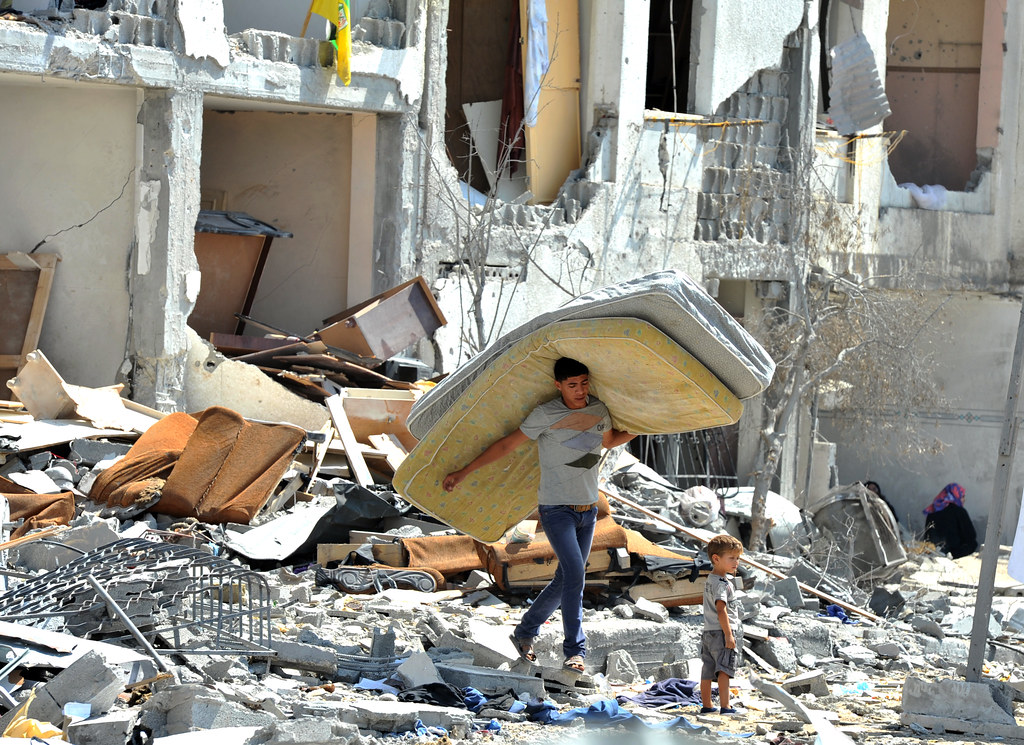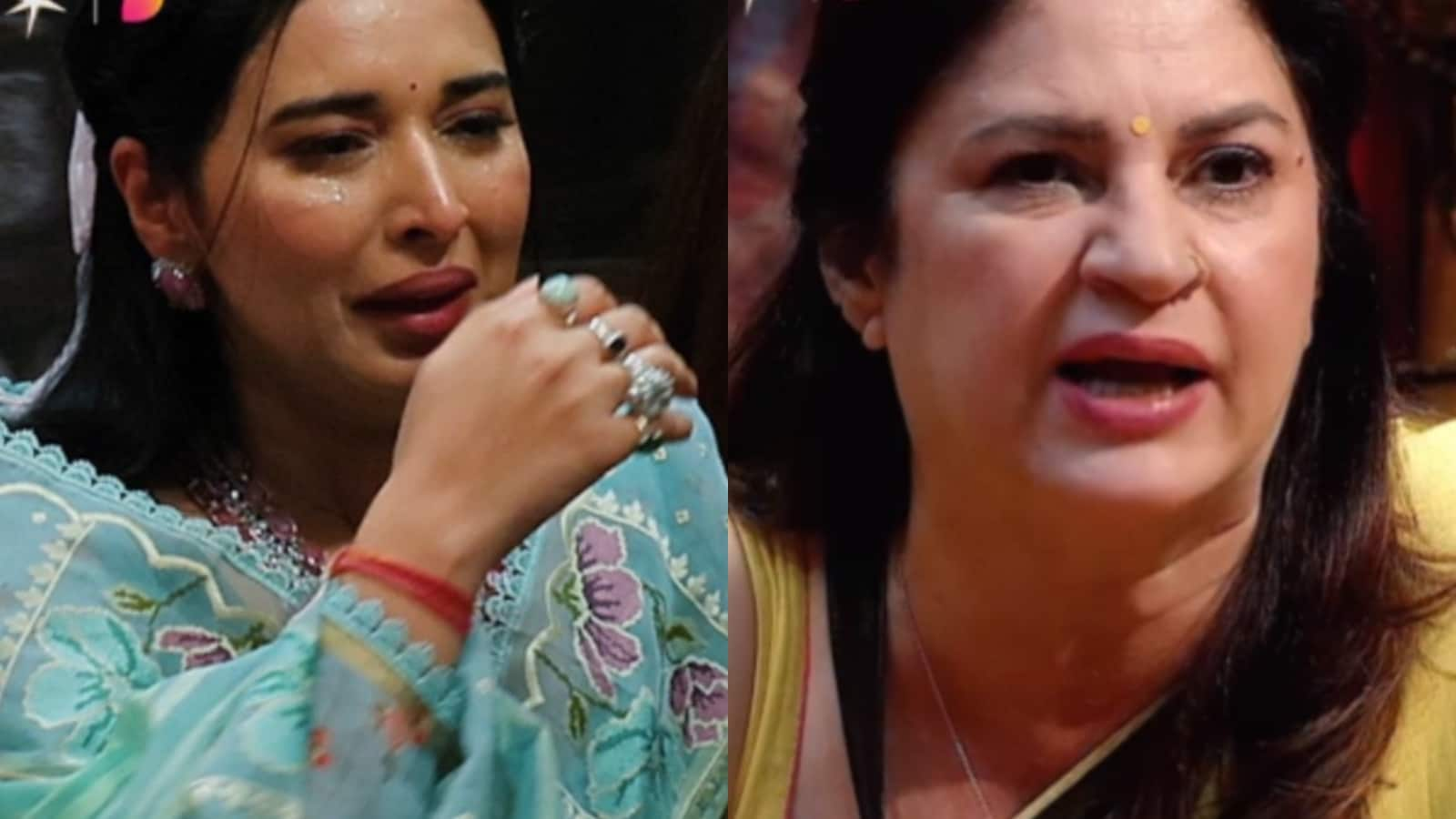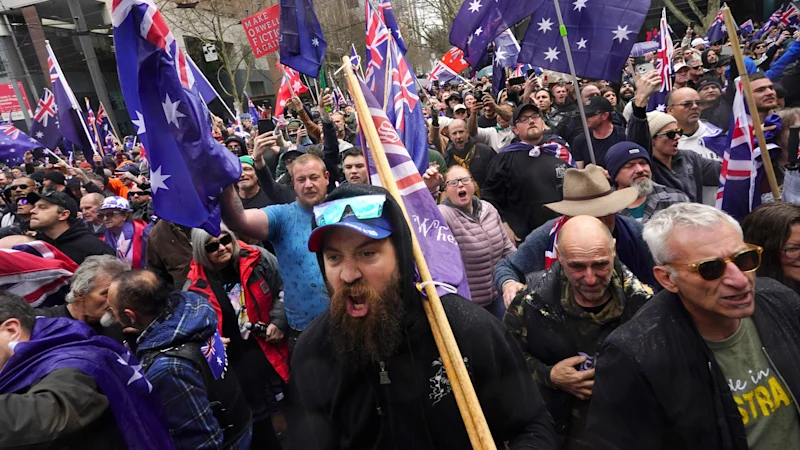By Naafia Nanabhai
Copyright mg

It was August 2023, and I felt I was being transported back to the 1980s, to my childhood in South Africa. Before me lay a sprawling village of tightly packed, squat concrete structures with corrugated metal roofs wending along slender dirt roads. It was my 13th trip to document human rights conditions in and around Israeli-occupied Palestinian Territory in 11 years. On this visit, as I stopped in Palestinian Bedouin communities in al-Naqab, I felt I could have been visiting apartheid-era black townships.
South Africa’s apartheid regime forcibly displaced my parents and their families to a township in northern KwaZulu-Natal. Like the villages in the al-Naqab in the 1960s, the township where I was born and raised was extremely poor and lacked government services. As a child, relatives told me about the spacious farms the apartheid regime stole from my parents’ families; about their goats, chickens and verdant vegetable fields. Meanwhile in our township, entire families were crowded into one or two rooms with no electricity and limited water, barely able to eke out a living.
The Bedouin dwellings in the Naqab, all within Israel’s borders, felt all too familiar. Their ties to the land date back millennia, yet Israeli policy leaves them fighting to remain in “unrecognised” villages. Overcrowded and mostly on inarable land, they too lacked electricity and water, as well as accessible schools. Yet many of the impoverished Bedouin villagers faced the potential loss of even this bare existence.
At the village of al-Araqib, for example, I learned that residents had just rebuilt their community for the 218th time in 13 years. With recycled and cheap materials, they rebuilt despite knowing Israeli forces would again tear down the structures. Al-Araqib’s land is desirable as it lies just within a region in the desert considered arable. A few years prior, the Israelis had ripped up the villagers’ olive and fruit trees.
They carried out this forced displacement operation under the guise of a “forestation” project by the Jewish National Fund (JNF). The fund is a quasi-Israeli government agency with non-profit status in the US and UK. Its projects destroy biodiversity and homes in the al-Naqab and West Bank.
As a black South African woman who grew up under apartheid, my experiences taught me the importance of solidarity with oppressed people. I became a human rights lawyer in an effort for global gender justice and was drawn to the Palestinian human rights struggle.
During my journeys in Palestine, it was impossible to miss the resonances between Palestinian’s and black South African’s experiences, including those of women. State-imposed racist oppression has reinforced and exacerbated gender inequity in both places.
Black people suffered under apartheid in South Africa, but apartheid policies disproportionately deprived the majority black women of educational and work opportunities, relegating them to the bottom of economic and social hierarchies. The legacy of this intersectional oppression is manifest in ongoing inequality, including today’s soaring poverty rates for black women and high levels of violence against them.
As it did to non-whites in South Africa, apartheid strips Palestinians of dignity. In addition to facing murder, disablement or loss of loved ones at the hands of Israeli forces, Palestinians endure daily oppression that undermines all aspects of their well-being. Palestinian women disproportionately suffer family separation due to Israeli laws that can render them stateless or unable to return to parts of Palestinian territory should they travel or marry. Representatives of Palestinian women’s human rights organisations, activists and the many Palestinian women who have had the privilege to meet and speak with over the years shared accounts with me of violence and arbitrary arrest at Israel’s ever-present checkpoints.
These experiences, discriminatory in themselves, further reinforce gender inequality. For fear they will be injured or killed by Israelis, some Palestinian families choose not to allow women and girl family members to attend school or to work outside the house. Israel’s racist movement restrictions also exacerbate harm against Palestinian gender violence survivors, who can rely on no meaningful legal system to protect their rights.
As witness to both apartheid South Africa and the regime of rights violations against Palestinians, I am unsurprised that major human rights organisations and UN experts joined Palestinian rights advocates in identifying Israeli crimes of apartheid. And I know anyone who honestly assesses both situations would find the atrocity denialist narratives from the South African Zionist Federation (SAZF) and members of the Democratic Alliance (DA) and other parties unbearable.
The SAZF, for example, recently framed the Nelson Mandela Foundation’s (NMF) campaign to counter the ethnic cleansing campaign espoused under Christian Zionism as “a gross distortion of everything” Nelson Mandela stood for. SAZF’s statement twisted NMF’s stance against colonialism and apartheid as opposition to “religious freedom”.
Mandela would have roundly rejected this misuse of human rights values to justify genocide and settler colonialism. He remarked in 1997: “[I]t beho[o]ves all South Africans, themselves erstwhile beneficiaries of generous international support, to stand up and be counted among those contributing actively to the cause of freedom and justice … we know too well that our freedom is incomplete without the freedom of the Palestinians”. He added, “All of us need to do more in supporting the struggle of the people of Palestine for self-determination.”
Prior to the SAZF’s statement, DA, Patriotic Alliance and African Christian Democratic Party members of parliament claimed to have found “no evidence of apartheid” against Palestinians. They stated that, “Israel is a vibrant progressive multi-racial and multi-ethnic society.” This followed their so-called “fact-finding mission” to Israel in May 2024, during which they reportedly spoke to no Palestinians.
B’Tselem, an Israeli human rights organisation, in its July 2025 report titled Our Genocide, sets out how Israel’s apartheid regime led to the genocide in Gaza. It explains how apartheid underlies Israel’s military rule of millions in the West Bank and its institutionalised discrimination against Palestinian citizens of Israel. Palestinian groups like Badil have long made similar observations.
In the true spirit of Nelson Mandela, the South African government, under the leadership of former minister of international relations and cooperation Dr Naledi Pandor, filed a case with the International Court of Justice, leading to the 2024 finding that Israel is committing a probable genocide in Gaza.
The government also called for recognition of apartheid being committed against Palestinians in a separate ICJ case, which found Israel’s occupation of Palestinian territory violates international law. South Africa was a co-convener of the Hague Group’s emergency summit in Bogotá, Colombia, in July, an effort to restore international rule of law and pursue accountability for grave crimes committed by Israel against Palestinians.
Against this backdrop of South African leadership in the struggle for accountability for international crimes, NMF and Madre, a feminist organisation, co-hosted a conference in June in Johannesburg on the draft crimes against humanity treaty under negotiation at the UN.
Legal experts; feminist scholars; lawyers representing South African apartheid victims; Palestinian human rights advocates; activists confronting persecution based on sexual orientation and gender identity; supporters of gender justice in Afghanistan and government members discussed how the apartheid provision of the treaty should be framed to contribute to justice for all victims. The need for justice for apartheid against Palestinians and the legacy of intersectional discrimination under apartheid in South Africa emerged as central themes.
Participants concluded that the South African government has a leadership role to play in ensuring the apartheid provision in the draft treaty accounts for all its victims and in calling for redress and reparations.
South Africa can build on pan-African solidarity evident in, for example, the African Commission on Human and People’s Rights condemnation of Israeli apartheid in recently adopted resolutions. Adopted in November 2024, resolution ACHPR/Res.611 (LXXXI) obligates African states parties to prevent genocide and to avoid aiding or abetting apartheid and other crimes against the Palestinians and the latest July 2025, resolution ACHPR/Res.641 (LXXXIV) which condemns Israeli illegal occupation and apartheid policies.
Both the political will that these actions exemplify, and modernised legal language in the draft treaty will be necessary to ensure justice for all apartheid victims, including Palestinians and all those who have suffered oppressive regimes based on intersecting forms of discrimination.
The current language in the draft treaty, copied from the Rome Statute, risks excluding Palestinians and others from recognition as apartheid victims. Rigid, biologically based interpretations of “racial groups” under apartheid and genocide could be reified unless the treaty drafters modernise the language. Participants agreed that “based on” should be added to the treaty, in congruence with understandings of race as a social construct under international human rights law and the crime of persecution.
Participants were informed of efforts to codify gender apartheid, a campaign that has gathered steam in the face of grave, systematic oppression based on gender in Afghanistan. Black South African feminist scholars noted that apartheid was always a racist, gendered and violently homophobic project. They cautioned that the understanding of apartheid in the draft treaty must account for this multi-faceted discrimination. They called for treaty drafters and civil society advocates to elevate black South African and Namibian feminists’ voices and scholarship and to ensure the negotiations, particularly on the apartheid provision, reflect their input. Mutual solidarity — not solidarity dependent on their continued erasure — is what they call on feminists around the world for.
This is especially pertinent as the limitations of South Africa’s approach to accountability for its own apartheid legacy come under scrutiny in its courts. As the country’s first charges of the crime against humanity are set to go to trial, we must ensure that the international push for accountability and reparations takes hold both in our foreign and domestic policy. As conference participants noted, individual criminal cases are important, but not enough. We must insist not only that the unspent millions in reparations funds go to those most impoverished and harmed under the apartheid regime, accounting for both the racist and patriarchal aspects of apartheid, and that the government recommit to transformative redress.
The negotiations for the draft treaty, which will obligate states to prevent and punish crimes against humanity, can be a platform to build momentum towards justice and reparations for apartheid. This momentum is desperately needed for the people of Palestine, who not only require recognition for genocidal crimes committed since October 2023, but also for decades of apartheid. This momentum is also necessary to ensure that victims of grave crimes committed on intersecting discriminatory grounds are finally recognised.
Entities like the SAZF and DA undoubtedly enjoy backing and support from powerful forces in places like Washington, but the tide is turning towards justice and recognition of grave crimes against Palestinians. Disingenuous PR campaigns cannot erase our own memories nor squash our natural will to solidarity with oppressed peoples. Now, more than ever, is the time to call for our government to continue to lead in the struggle for apartheid accountability.
Wendy Isaack is a senior gender justice and international law fellow at Madre, an international human rights organisation.



